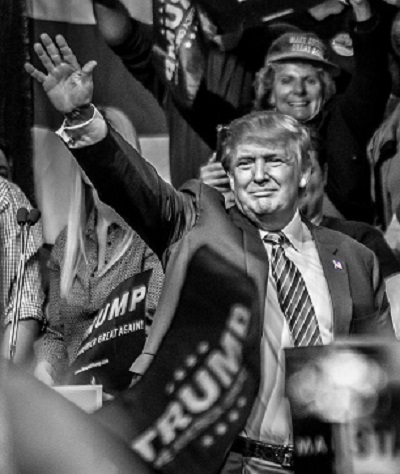Did you know that Truthout is a nonprofit and independently funded by readers like you? If you value what we do, please support our work with a donation.
Donald Trump’s call on Russia to hack and release Hillary Clinton’s deleted emails was one of the stranger moments in what’s been one of the stranger campaigns in US history.
It was a sign that Trump is either stupid or trying to join the Ronald Reagan/Richard Nixon club of Republicans who have betrayed their country to get elected president.
But as bizarre as it was, Trump’s “Russian request” wasn’t the most interesting part of his press conference yesterday in Tampa, Florida — that came when he accused Vladimir Putin of calling President Obama “the N-Word.”
See more news and opinion from Thom Hartmann at Truthout here.
He said, “Putin has said things over the last year that are really bad things, okay? He mentioned the N-word one time. I was shocked to hear him mention the N-word. You know what the N-word is, right? He mentioned it. I was shocked.”
So, there is almost zero chance that what Trump said happened actually happened.
As Robert Mackey points out in The Intercept, it’s never been reported in any reputable news outlet anywhere the world, and since Trump himself admits that he’s never met Putin, there’s no chance the Russian President said it to him in private.
So if Trump didn’t hear Putin calling President Obama the N-word himself, and didn’t read about him saying it in a newspaper, where did he get the idea that it happened (assuming, of course, that he’s not just making this all up for show)?
Well, as Robert Mackey goes on to explain in his Intercept piece, right-wing racists on Twitter have been daydreaming for years about the idea that Putin calls President Obama the N-word.
For example, one Twitter user who goes by the name “Craig-infidel” and calls himself an “Arch-conservative” tweeted back in July, 2013, “I’ll bet you a dollar to a donut that Putin uses the “N” word when talking about Obama!”
Another Twitter user named Jasper Mallis sent out a similar tweet in 2014, quoting the hard-right website Free Republic as saying, “‘I bet that Putin and his advisers use the N word constantly when discussing how to deal with Obama.'”
In other words, unless Trump simply pulled this line out of his backside, he got it from reading Twitter — and believing everything he reads!
This actually isn’t the first time Trump has drawn inspiration from neo-Nazis and racists on Twitter.
Just a few weeks ago, he sent out and then quickly deleted a tweet with an image of Hillary Clinton in front of a background of dollar bills and what appeared to be a Star of David. Mic.com later traced that image to a neo-Nazi message board.
A few months before that, Trump retweeted a graphic that claimed that 81 percent of murdered white people are killed by Black people. The person who originally tweeted that graphic was a neo-Nazi whose Twitter account featured a Swastika avatar and openly praised Hitler.
Obviously, Twitter can be a confusing place. Everyone tweets irresponsible things now and then.
But with Trump, these mistakes aren’t really mistakes — they’re a feature, not a bug, of his candidacy.
This is scientific fact. One recent study by the social media analytics company Little Bird found that over the course of just one week in January, “62 percent of the people Trump retweeted also followed white supremacist accounts.”
In other words, neo-Nazis really like Donald Trump, and he likes them back.
This is unsettling enough already, but what’s really scary is that if yesterday’s N-word comments are any indication, the relationship between Trump and his neo-Nazi Twitter followers could be more than just one of mutual flattery.
It now looks like Trump could actually believe what those neo-Nazis think.
This is absolutely terrifying.
Here we have a candidate for the most powerful political office in the world openly flirting with the darkest fringes of the far-right.
And even if Trump doesn’t believe what these people think, he’s bringing their ideas out in the open by tweeting memes and giving them shout-outs in press conferences.
He’s not making America great again; he’s making US white supremacy acceptable again.
Trump is a racist and a crypto-fascist, and the many of the people who actually are paying attention to his policies and still support him are even worse.
Speaking against the authoritarian crackdown
In the midst of a nationwide attack on civil liberties, Truthout urgently needs your help.
Journalism is a critical tool in the fight against Trump and his extremist agenda. The right wing knows this — that’s why they’ve taken over many legacy media publications.
But we won’t let truth be replaced by propaganda. As the Trump administration works to silence dissent, please support nonprofit independent journalism. Truthout is almost entirely funded by individual giving, so a one-time or monthly donation goes a long way. Click below to sustain our work.
